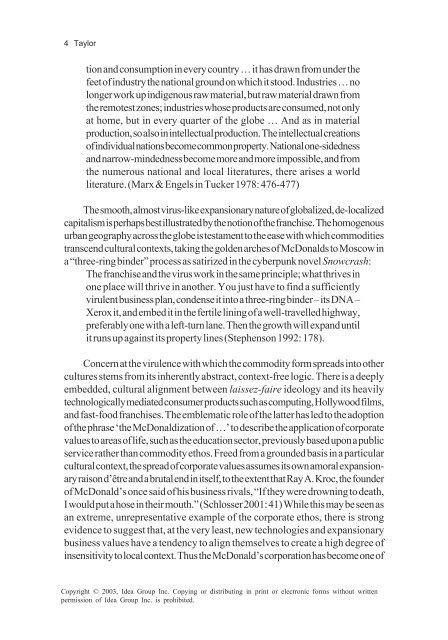www.sharexxx.net - free books & magazines
www.sharexxx.net - free books & magazines
www.sharexxx.net - free books & magazines
Create successful ePaper yourself
Turn your PDF publications into a flip-book with our unique Google optimized e-Paper software.
4 Taylor<br />
tion and consumption in every country … it has drawn from under the<br />
feet of industry the national ground on which it stood. Industries … no<br />
longer work up indigenous raw material, but raw material drawn from<br />
the remotest zones; industries whose products are consumed, not only<br />
at home, but in every quarter of the globe … And as in material<br />
production, so also in intellectual production. The intellectual creations<br />
of individual nations become common property. National one-sidedness<br />
and narrow-mindedness become more and more impossible, and from<br />
the numerous national and local literatures, there arises a world<br />
literature. (Marx & Engels in Tucker 1978: 476-477)<br />
The smooth, almost virus-like expansionary nature of globalized, de-localized<br />
capitalism is perhaps best illustrated by the notion of the franchise. The homogenous<br />
urban geography across the globe is testament to the ease with which commodities<br />
transcend cultural contexts, taking the golden arches of McDonalds to Moscow in<br />
a “three-ring binder” process as satirized in the cyberpunk novel Snowcrash:<br />
The franchise and the virus work in the same principle; what thrives in<br />
one place will thrive in another. You just have to find a sufficiently<br />
virulent business plan, condense it into a three-ring binder – its DNA –<br />
Xerox it, and embed it in the fertile lining of a well-travelled highway,<br />
preferably one with a left-turn lane. Then the growth will expand until<br />
it runs up against its property lines (Stephenson 1992: 178).<br />
Concern at the virulence with which the commodity form spreads into other<br />
cultures stems from its inherently abstract, context-<strong>free</strong> logic. There is a deeply<br />
embedded, cultural alignment between laissez-faire ideology and its heavily<br />
technologically mediated consumer products such as computing, Hollywood films,<br />
and fast-food franchises. The emblematic role of the latter has led to the adoption<br />
of the phrase ‘the McDonaldization of …’ to describe the application of corporate<br />
values to areas of life, such as the education sector, previously based upon a public<br />
service rather than commodity ethos. Freed from a grounded basis in a particular<br />
cultural context, the spread of corporate values assumes its own amoral expansionary<br />
raison d’être and a brutal end in itself, to the extent that Ray A. Kroc, the founder<br />
of McDonald’s once said of his business rivals, “If they were drowning to death,<br />
I would put a hose in their mouth.” (Schlosser 2001: 41) While this may be seen as<br />
an extreme, unrepresentative example of the corporate ethos, there is strong<br />
evidence to suggest that, at the very least, new technologies and expansionary<br />
business values have a tendency to align themselves to create a high degree of<br />
insensitivity to local context. Thus the McDonald’s corporation has become one of<br />
Copyright © 2003, Idea Group Inc. Copying or distributing in print or electronic forms without written<br />
permission of Idea Group Inc. is prohibited.









